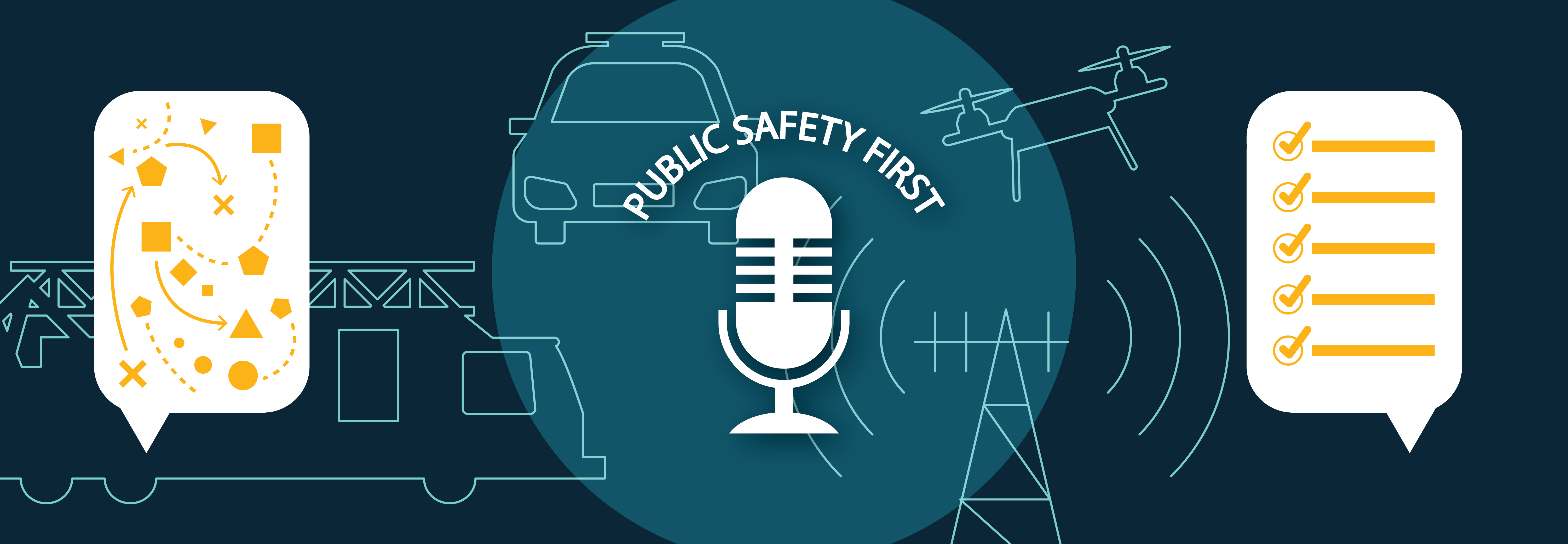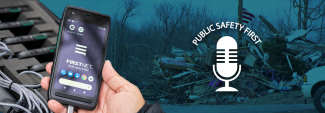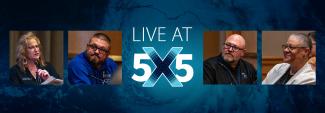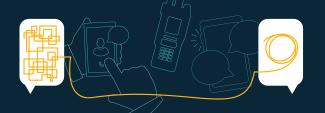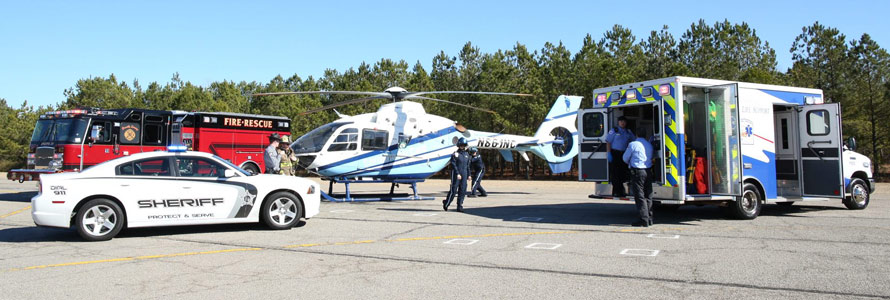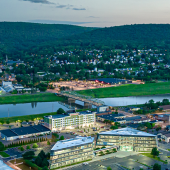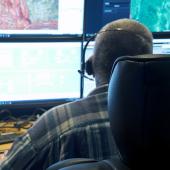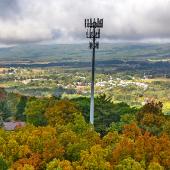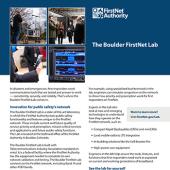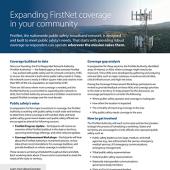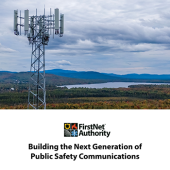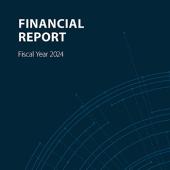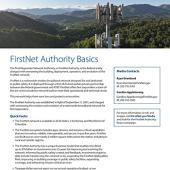Summary
Guest
Molly Hahn, FirstNet Authority Public Affairs Specialist
Doug Harder, FirstNet Authority Senior Public Safety Advisor
Transcript
Preview
Narrator: You're listening to Public Safety First, a podcast to help you learn about the First Responder Network Authority and how you can be part of the future of public safety technology.
And now, your host.
Narrator: You're listening to Public Safety First, a podcast to help you learn about the First Responder Network Authority and how you can be part of the future of public safety technology.
And now, your host.
Molly Hahn: Hello and welcome to At Its Core, the podcast here at the FirstNet Authority, where we detangle and demystify technical topics so that the average person can understand them. I'm Molly Hahn, a public affairs specialist here at the FirstNet Authority and I am beyond excited for this guest. He is going to provide us with some really engaging content about some really exciting events. So, welcome Doug Harder. Why don't you tell us about yourself and what's your role here at the FirstNet Authority?
Doug Harder: Thanks, Molly. My name is Doug Harder. I'm with the Stakeholder Collaboration Division in the Public Safety Advocacy group here in FirstNet Authority. I came to FirstNet about almost 11 years ago now. And I've kind of evolved into my current role as the lead for all things events and incidents that deal with deployable assets.
Molly Hahn: Excellent. And you are my inside connection to this program that we're going to start talking about, which is the Network Experience Engagement Program. What is NEEP?
Doug Harder: So, NEEP is actually a combination of three different programs. Early on here at the FirstNet Authority, even before we really had a partner in place, we knew that there was going to be a need for planning for events with public safety. All the carriers out there, they do a really good job of working with their commercial subscribers, planning for commercial subscribers at large events, but they've never really dealt with public safety before. And so, we came up with this event planning engagement, where we go in and talk to public safety about where do they need coverage, where is public safety operating, doing other things that they would need coverage for? So, that was the start of it.
The second part of it was actually the exercise support. So, the core of the exercise support became a inject catalog where we have over 800 injects in the catalog for functional exercises and tabletop exercises. It all fits in nicely with the HSEEP guidance, which is the federal exercise guidance. And it's available to everyone for free. There's no charge just to use for ideas for broadband injects for your exercises.
And then the third piece of it came about after some large events and incidents where sometimes things worked well, sometimes things didn't work so well, and we wanted a way to talk to public safety about their experience during their incident or event on the FirstNet network. And so, we created what we called the Post Incident Event Review process, or a PIER. And it's much like an after-action report. The only real difference is, is that kind of a hallmark of those after-action reports, is the corrective action plan that's at the end of it. We don't provide a corrective action plan. We are more documenting their experience during their incident or event and then using that information to work with our partner to do things differently and better. If there was an issue, use it as a lesson learned and a best practice if things went well during those incidents and events that occur in the future.
Molly Hahn: Interesting. Yeah. It sounds like these three engagements all sort of build on each other, and you're learning lessons from them. Is that sort of right in the sense that you can do a pre-event and then you could do a post event or even just an exercise and kind of see those unique needs that public safety has during these events?
Doug Harder: Yeah, absolutely. From a planning perspective, it all kind of goes together. It's a big circle. So, you know, during planning you're identifying various things where you need coverage or maybe some technology that you need to acquire. During planning, a lot of times, especially for the very large events, there's exercises that go on and then you learn from those exercises, you know, this works, that didn't work. We need to fix that. And then, of course, at the end of the event, you would do an after-action report, or a PIER in our case, and document any issues that there were and identify solutions for those, and then also highlight the successes so that you have best practices going forward.
Molly Hahn: And here at the FirstNet Authority, what's kind of our unique place in this?
Doug Harder: Yeah. So, our unique role is that we go out to public safety, and we listen to what they need. We don't try to tell them how to do their business. Every agency is slightly unique. They all have some unique characteristics, some way that they do things that's different. So, we generally try to listen more than we talk. Throughout the years of doing these, we have created a facilitator’s checklist of things to bring up in these meetings. They're just topics to get the public safety responders in the meeting to talk to us about what's going on. And it's really quite amazing. We get in these meetings a lot of times and they're like, you know, "Why are we doing this? Here we are planning again, we do these events every year for the last 50 years. We know what we're doing." And then about ten minutes in when I start asking the questions, they start to give us answers. And then they say, "Oh yeah, and there's this too. And then there's that also. And hey, are we going to talk about some other topic over here?” And” yeah, we'll get to that later." So, it really starts to get them to open up to us and to talk to us more about their event. We are less concerned about what the public is doing than we are about what public safety is doing to keep the public safe.
Molly Hahn: So, it sounds like we can use all of these lessons to start planning for any event that comes up. What does that planning process start to look like? How do you even start those conversations?
Doug Harder: Yeah. We do a lot of large events that plan for over the course of a year. We also do the smaller events like the festivals and the boat races and the golf tournaments that are much shorter planning period. And so, we'll come in for those and have about a two-hour meeting with you. Usually those can be set up through your PSA [senior public safety advisor]. Each state has a representative within Public Safety Advocacy here at the FirstNet Authority, and you can contact them and reach out through them to set that up. Once we get that set up, we'll schedule a call, usually to go over everything with you, just kind of get an idea of what we're going to be talking about so you get the right people at that meeting, and then we'll have the meeting. We'll go through that checklist that I was talking about. We'll gather all the information together that you tell us about. We usually have a map up on the screen, and we're dropping pins on the maps for all the locations where you would need assistance or coverage, and then following that meeting, we would come back and put a planning document together. We deliver that planning document to the agency that requested the support, and then we provide that document also over to our partner, so that when they're doing their solution planning, they have all of this information handy and ready for them to take into consideration when they're determining what the right solution for your event is. That's kind of the end goal of all of this is we want them to be able to provide the right solution, not just a solution.
Molly Hahn: And it sounds like you use all of your expertise, Doug, on how they can have the best solution possible throughout the event, whether it's in a rural area or a congested city. It sounds like you've been on a lot of these. What is your favorite one you've ever participated in?
Doug Harder: My favorite one actually might be the first one that we did, which was this speedboat race in Lake Ozark, Missouri. It was a group from the fire department there. They were a little skeptical at first. I was really just trying to get this whole program off the ground. They said, "You know what? Let's do it. Let's see what happens." And it was really interesting because of the size of the event, the distance that it covered. It was over water, obviously being a speedboat race. We were able to help them out with some things that they still do to this day, as far as I know, with location tracking of the boats that are out on the water, kind of monitoring the event. It kind of showed us really what we could do, and everything that we are doing today, even up to Super Bowls and inaugurations, it really all came out of that first event. And because I went into that one without a checklist and we just started talking and the checklist was started after that meeting, and that engagement and to this day, that's just the fact that a boat race got us going. That kind of is my favorite one.
We are on our eighth Super Bowl now, planning for our eighth Super Bowl. We've done two inaugurations now. We are in the middle of the largest sporting event the world has ever seen with the 2026 FIFA World Cup that's taking place in the summer of 2026 , and when I was talking about that one to our leadership here and saying, "Hey, we're going to need to do this. Think of it as about, 80 plus Super Bowls over 39 days in 11 cities.” So, we have been working on that. So, that's a good thing.
Molly Hahn: Your knowledge is really what's carried through all of these events, right? And our team's knowledge is what's making it so that this is as big as it wants to be or as small as it wants to be. But everyone's event is important.
Doug Harder: That's right. And it's also the consistency of what we're talking about with the agencies and then providing over to our partner to be able to provide that correct solution, that right solution, no matter whether it's a small event or a large event because it's all a large event to that area. Everybody has a Super Bowl. It just doesn't have 70,000 people in a stadium and worldwide coverage.
Molly Hahn: Yeah. And it sounds like we're just going to keep growing and getting better at this. Before we sign off, Doug, is there anything else you want to share with people about NEEP? Any way that they could get involved or engaged, if they seem like they want to start using our knowledge and yours and the team specifically?
Doug Harder: Just reach out. No event is too small or too big. We've done the very small festivals. We've done the big ones that you hear about that maybe aren't the biggest thing around. This past year, we did Groundhog Day in Punxsutawney, Pennsylvania. The engagement is free. There's no cost to you to talk to us about it. It's really just a couple hours of your time to provide us with the information that you're going to hopefully be thinking about anyway.
We’ve had nothing but success at the events that we've been able to talk to people about. And, I think it has to do a lot with the engagement of the responders out there. Once we do get in and start talking to them, they're very welcoming. It's a good way to have a successful event in the end.
Molly Hahn: Amazing. Thanks, Doug, for taking your time. This has been excellent. I look forward to every event that you all plan, and I'm really excited to see it keep going. Thanks again.
Doug Harder: Great. Thanks for having me.
Narrator: Thanks for listening today. We're excited to have you join our podcast community. Make sure to subscribe on iTunes, SoundCloud, and YouTube. You can learn more about the First Responder Network Authority at FirstNet.gov and learn about FirstNet products and services at FirstNet.com.


